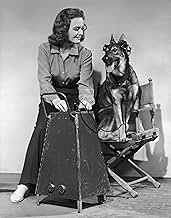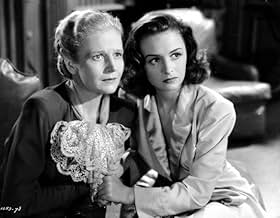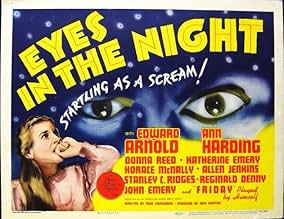IMDb RATING
6.7/10
2.1K
YOUR RATING
A blind detective and his seeing-eye dog investigate a murder and discover a Nazi plot.A blind detective and his seeing-eye dog investigate a murder and discover a Nazi plot.A blind detective and his seeing-eye dog investigate a murder and discover a Nazi plot.
- Director
- Writers
- Stars
Stephen McNally
- Gabriel Hoffman
- (as Horace McNally)
Stanley Ridges
- Hansen
- (as Stanley C. Ridges)
Rosemary DeCamp
- Vera Hoffman
- (as Rosemary de Camp)
Steven Geray
- Anderson
- (as Steve Geray)
John Butler
- Taxicab Driver
- (uncredited)
Edward Kilroy
- Pilot
- (uncredited)
- Director
- Writers
- All cast & crew
- Production, box office & more at IMDbPro
Featured reviews
If you're a dog lover like me, you'll find this one hard not to like! Good old "Friday" steals this show-with some able assistance from a very keen and rugged blind man. I found this one easy to follow and it kept my interest all the way. A really neat mix of intrigue, mystery, and humor to boot. Oh...and some espionage thrown in as is per this era's thematics. The gal who plays the enemy is quite wicked!
This is a murder mystery that will get you smiling! A fun and easy frolic minus a tangled plot that uses all the "senses". Oh, and a young Donna Reed.......not bad at all. This one makes Rin Tin Tin and Lassie look like amateurs!
This is a murder mystery that will get you smiling! A fun and easy frolic minus a tangled plot that uses all the "senses". Oh, and a young Donna Reed.......not bad at all. This one makes Rin Tin Tin and Lassie look like amateurs!
Edward Arnold plays a blind detective asked to look into the murder of an actor. Very quickly things become complicated as Arnold realizes that there are sinister forces at work that are not run of the mill.
This is a great thriller. I would love to say mystery, except that the mystery is solved about a third of the way through. Granted there are other details to work out, but the mystery is effectively over. Thats not to say you won't be sitting on the edge of your seat, you will. Arnold is an imposing figure and its a joy to watch this "helpless" man turn the tables on all of those around him. We in the audience know he's far from helpless, having witnessed the opening judo lesson, so we know whats in store for those who think they can get the upper hand on him.
The film isn't perfect. There are a few contrived bits and the end is rushed, still its 80 minutes well spent. The highest praise I can think of is if you're like me you'll probably wish there was more with this character. (Actually there is one more film, made three years later called the Hidden Eye, unfortunately that was it)
8 out of 10
This is a great thriller. I would love to say mystery, except that the mystery is solved about a third of the way through. Granted there are other details to work out, but the mystery is effectively over. Thats not to say you won't be sitting on the edge of your seat, you will. Arnold is an imposing figure and its a joy to watch this "helpless" man turn the tables on all of those around him. We in the audience know he's far from helpless, having witnessed the opening judo lesson, so we know whats in store for those who think they can get the upper hand on him.
The film isn't perfect. There are a few contrived bits and the end is rushed, still its 80 minutes well spent. The highest praise I can think of is if you're like me you'll probably wish there was more with this character. (Actually there is one more film, made three years later called the Hidden Eye, unfortunately that was it)
8 out of 10
Edward Arnold plays blind detective Duncan Maclain in "Eyes in the Night," a 1942 MGM film directed by Fred Zinnemann that has a lot of other familiar faces.
Ann Harding made her return to the screen after a few years in this small film, playing the stepmother, Norma Lawry, of a young actress, Barbara (Donna Reed at 21), who's fallen in love with an older actor with whom Harding was once involved.
Norma wants Mac to help her convince the actor it's best to steer clear of Barbara. Norma's husband is in Washington presenting a formula to the government that is critical to the war effort.
Unfortunately, the actor turns up dead, and Barbara sees not only his dead body, but her stepmother, when she arrives at the man's apartment. Norma goes running to Mac for help. He sets out to find the killer, and it leads him into a web of espionage.
Nice job by Zinnemann, who was just starting out, though he didn't like doing the film except for working with Ann Harding and Donna Reed. As others have mentioned, his pitch black gun battle with the only light coming from the fired shots is most effective and portends the great things to come from him. Overall, it's an okay story, well done.
Edward Arnold does an excellent job (though Zinnemann said he kept blowing his lines) as the smart and likable blind detective, who is aided by an assistant (Allen Jenkins) and his dog Friday, who looks to be a German shepherd mix.
Friday is unbelievable - what an actor and athlete! That dog had some training. Zimmemann didn't agree. Friday, who was descended from a silent dog star named Flash, apparently was only good for one take, becoming bored easily. In fact, Friday's only film appearances are in the two Duncan Maclain films.
Besides Reed, one can spot Rosemary DeCamp as Vera the maid, Stanley Ridges as the butler, Stephen McNally as Vera's husband Gabriel, Mantan Moreland as Mac's butler, and I honestly thought Katherine Emery WAS Mercedes MacCambridge. Wow! Even the speaking voice.
This was intended as a series for MGM, but the studio only made one other. Universal took the fat man detective series from the radio and made a film with J. Scott Smart with an early appearance by Rock Hudson directed by William Castle, but never followed it up. Nevertheless, there's something about these fat detectives, going back to Nero Wolfe, I guess, that's appealing.
Enjoyable. Glad Friday was able to keep his date after all.
Ann Harding made her return to the screen after a few years in this small film, playing the stepmother, Norma Lawry, of a young actress, Barbara (Donna Reed at 21), who's fallen in love with an older actor with whom Harding was once involved.
Norma wants Mac to help her convince the actor it's best to steer clear of Barbara. Norma's husband is in Washington presenting a formula to the government that is critical to the war effort.
Unfortunately, the actor turns up dead, and Barbara sees not only his dead body, but her stepmother, when she arrives at the man's apartment. Norma goes running to Mac for help. He sets out to find the killer, and it leads him into a web of espionage.
Nice job by Zinnemann, who was just starting out, though he didn't like doing the film except for working with Ann Harding and Donna Reed. As others have mentioned, his pitch black gun battle with the only light coming from the fired shots is most effective and portends the great things to come from him. Overall, it's an okay story, well done.
Edward Arnold does an excellent job (though Zinnemann said he kept blowing his lines) as the smart and likable blind detective, who is aided by an assistant (Allen Jenkins) and his dog Friday, who looks to be a German shepherd mix.
Friday is unbelievable - what an actor and athlete! That dog had some training. Zimmemann didn't agree. Friday, who was descended from a silent dog star named Flash, apparently was only good for one take, becoming bored easily. In fact, Friday's only film appearances are in the two Duncan Maclain films.
Besides Reed, one can spot Rosemary DeCamp as Vera the maid, Stanley Ridges as the butler, Stephen McNally as Vera's husband Gabriel, Mantan Moreland as Mac's butler, and I honestly thought Katherine Emery WAS Mercedes MacCambridge. Wow! Even the speaking voice.
This was intended as a series for MGM, but the studio only made one other. Universal took the fat man detective series from the radio and made a film with J. Scott Smart with an early appearance by Rock Hudson directed by William Castle, but never followed it up. Nevertheless, there's something about these fat detectives, going back to Nero Wolfe, I guess, that's appealing.
Enjoyable. Glad Friday was able to keep his date after all.
I'd never heard of this film, but discovered it bundled in with a lot of other 30s/40s B-movies in the "Mystery Classics" collection from Platinum Video. It's a surprisingly good film, really a near-great film that's hobbled a bit by it's middle act.
The first part of the film is really the only part that's a straight-forward detective romp, w/ a blind detective and his seeing-eye-dog and his hired muscle simpleton helping him sleuth out a fairly typical wrongfully-accused-murder plot. This part of the film is all golden, partially, I think, because the Detective's characters (All intended to be recurring characters in an ongoing film franchise that never quite got off the ground after this really good first chapter) feel like they have a past together, they feel like they know who they are, which is unusual for a potboiler of this era.
The second act resolves the murder a bit too quickly - in fact, it's never exactly resolved, the film merely abruptly changes focus from the detective et al to the murderers themselves discussing why they did it. This robs the film of most of it's dramatic strength, and essentially the middle act becomes little more than filler. It's entertaining enough filler - a sort of World War II version of "Wait Until Dark" - but it doesn't really advance the plot much.
The third act is the somewhat-rushed climax/resolution, though it features an unexpectedly cool shootout filmed in a very unusual style, and extended sequence with the detective's amazingly-well-trained dog. (Seriously, this dog is great! He could easily do his own taxes. He makes any other trained film dog - and really most trained film monkeys - look like idiots by comparison). On the whole, the film ends well, but it never fully recovers the momentum it lost by shifting focus in the middle, and as a result the final wrap up just comes across as slightly unsatisfying. It is, however, a more than satisfying introduction to what no doubt would have been a great detective series which, sadly, never really took off. I'm very surprised the concept was never revisited on TV or Radio, since the central character is endlessly entertaining.
One odd note: the ending feels a bit truncated, with some of the action happening off-camera. For instance, early on one of the bad guys is captured and held by the detective's men. Later on, we're shown the detective's men bound and gagged, the bad guy having evidently escaped. Later the bad guy reunites with his own people, but the transition is so abrupt that it feels like we're missing a scene or two. Also, there's a subplot in which the bad guys are hiding family information from one of their own people. This sets up what is obviously intended to be a major plot point, but, in the end absolutely nothing comes of it. Again, is this a missing scene, or simply bad writing? I can't tell.
Still and all, this is a near-classic film with a great character and some fantastic performances that unfortunately hobbles itself. Well worth a viewing, however.
The first part of the film is really the only part that's a straight-forward detective romp, w/ a blind detective and his seeing-eye-dog and his hired muscle simpleton helping him sleuth out a fairly typical wrongfully-accused-murder plot. This part of the film is all golden, partially, I think, because the Detective's characters (All intended to be recurring characters in an ongoing film franchise that never quite got off the ground after this really good first chapter) feel like they have a past together, they feel like they know who they are, which is unusual for a potboiler of this era.
The second act resolves the murder a bit too quickly - in fact, it's never exactly resolved, the film merely abruptly changes focus from the detective et al to the murderers themselves discussing why they did it. This robs the film of most of it's dramatic strength, and essentially the middle act becomes little more than filler. It's entertaining enough filler - a sort of World War II version of "Wait Until Dark" - but it doesn't really advance the plot much.
The third act is the somewhat-rushed climax/resolution, though it features an unexpectedly cool shootout filmed in a very unusual style, and extended sequence with the detective's amazingly-well-trained dog. (Seriously, this dog is great! He could easily do his own taxes. He makes any other trained film dog - and really most trained film monkeys - look like idiots by comparison). On the whole, the film ends well, but it never fully recovers the momentum it lost by shifting focus in the middle, and as a result the final wrap up just comes across as slightly unsatisfying. It is, however, a more than satisfying introduction to what no doubt would have been a great detective series which, sadly, never really took off. I'm very surprised the concept was never revisited on TV or Radio, since the central character is endlessly entertaining.
One odd note: the ending feels a bit truncated, with some of the action happening off-camera. For instance, early on one of the bad guys is captured and held by the detective's men. Later on, we're shown the detective's men bound and gagged, the bad guy having evidently escaped. Later the bad guy reunites with his own people, but the transition is so abrupt that it feels like we're missing a scene or two. Also, there's a subplot in which the bad guys are hiding family information from one of their own people. This sets up what is obviously intended to be a major plot point, but, in the end absolutely nothing comes of it. Again, is this a missing scene, or simply bad writing? I can't tell.
Still and all, this is a near-classic film with a great character and some fantastic performances that unfortunately hobbles itself. Well worth a viewing, however.
Happened on this movie entirely by chance, while skipping through the limited offers on local daytime TV. Decided to sit it out (I'm a sucker for 1930s and 40s black-and-white films) and was very pleased I did. This movie is a thriller of sorts, and it has a major twist: it features a blind detective - quite convincingly, I must add, since he has a very smart (scene-stealing) seeing-eye dog to help him. The story has enough action, suspense, and surprises to keep the viewer interested until the very end. It isn't Hitchcock, but it's very nicely done. Recommended.
Did you know
- TriviaThe first film in what was meant to be to be a mystery franchise focused on blind detective Duncan Maclain who solved murders with the help of his seeing eye dog, Friday. When the second entry, L'oeil caché (1945), failed to elicit sufficient interest, MGM ended the series.
- GoofsWhen the butler/enemy agent Hansen confronts Duncan MacLean loudly playing the organ in the middle of the night, Hansen ruffles his own hair to appear as if he has been sleeping and just awakened - clearly forgetting that MacLean cannot see his appearance.
- Crazy creditsFriday appears as himself.
- Alternate versionsThere is now a colorized version available. Highly recommended as much of the film is set in the dark which doesn't register well in the b&w original.
- ConnectionsFeatured in Personalities (1942)
- How long is Eyes in the Night?Powered by Alexa
Details
Box office
- Budget
- $433,000 (estimated)
- Runtime1 hour 20 minutes
- Color
- Aspect ratio
- 1.37 : 1
Contribute to this page
Suggest an edit or add missing content

Top Gap
By what name was Les yeux dans les ténèbres (1942) officially released in India in English?
Answer































